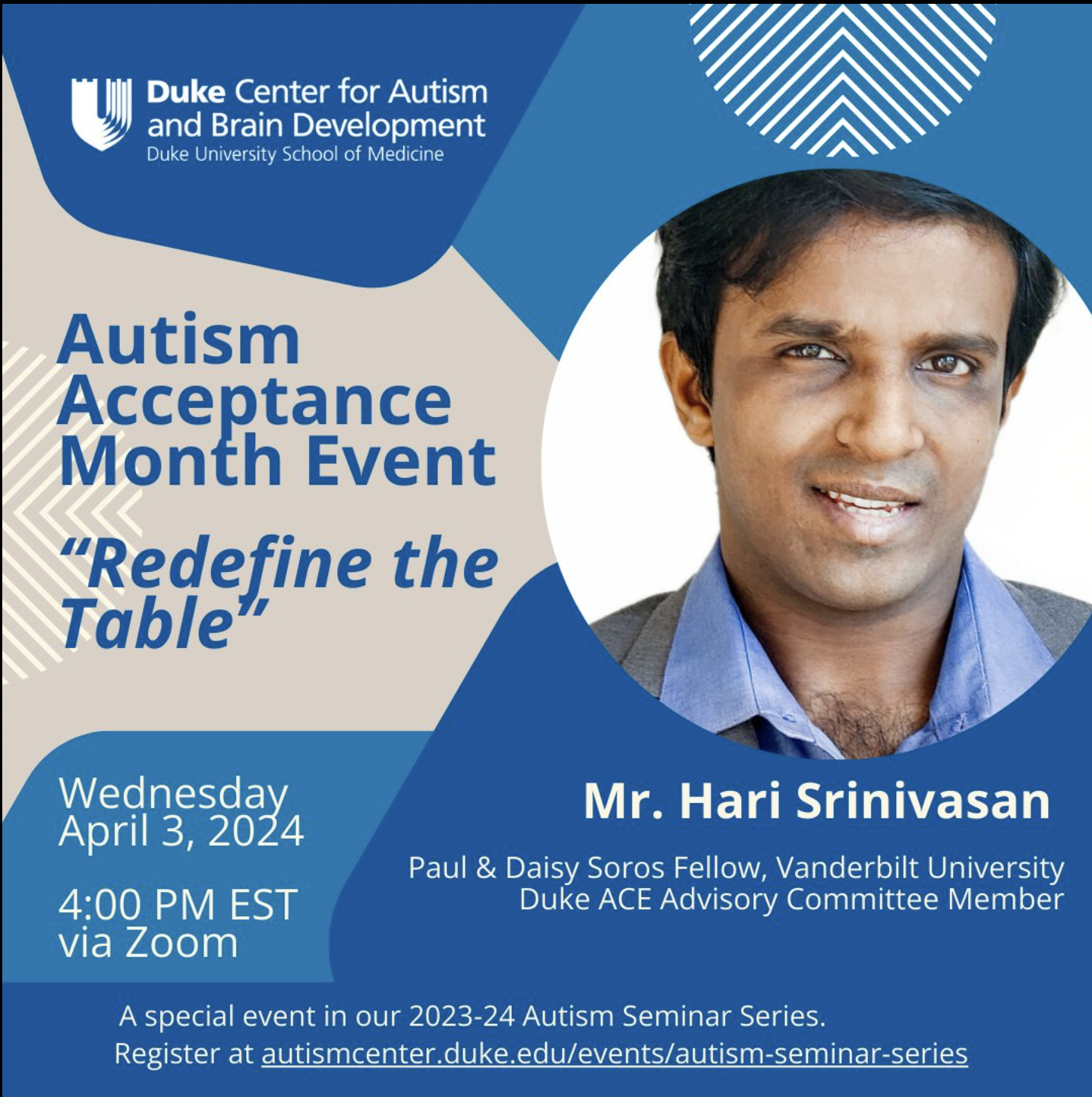April events
My events this April include
- Keynote at Duke's ACE event (Apr 3)
- TedX talk (Apr 20)
- Two Panels Mar 27 (Mary Ann Libert) & Apr 17 (Lancet).
Keynote at Duke ACE Autism Seminar Series
Public Voices Fellowship Year One
Positive Psychology and Autism
Keynote Speaker at Duke
Autism Acceptance Month Keynote Presentation: "Redefine the Table"
April 3, 2024 | 4:00pm - 5:00pm ET
Zoom Webinar
Please join us for a special event in our 2023-24 Duke Center for Autism Seminar Series! Our Autism Acceptance Month Keynote presenter will be Hari Srinivasan. A self-advocate, Mr. Srinivasan is a PhD student in neuroscience at Vanderbilt University, an alumnus of the University of California, Berkeley, a Paul & Daisy Soros Fellow, a NISE fellow at the Frist Center for Autism & Innovation at Vanderbilt University, and a public member of the Interagency Autism Coordinating Committee. At UC Berkeley, Mr. Srinivasan majored in psychology with a minor in disability studies and graduated as a University Medal Finalist, along with a Departmental Citation Award, Highest Honors, Phi Beta Kappa, and Psi Chi. He was an undergraduate Haas Scholar and carried out a year-long study on awe and empathy in autism. He was also lead student instructor for a weekly class on autism, creating and teaching content that covered a myriad of issues across the lifespan. As a student journalist at The Daily Californian, he wrote over 50 articles on both disability and non-disability topics. As part of his graduate program, he will research the sensorimotor space, specifically peripersonal space (PPS), which has practical implications on multiple fronts for autism. He has autism and ADHD. His autism includes limited speaking ability, sensorimotor issues, health issues, OCD, mood dysregulation and social anxiety. His non-academic affiliations span law and policy to research arenas such as IACC, DREDF, ASAN, ASA, INSAR, Autism Europe and The Brain Foundation. PLEASE REGISTER IN ADVANCE AT THE LINK PROVIDED.
Speaker(s): Hari Srinivasan
Duke Event Series: Duke Center for Autism Seminar Series
Duke Event Co-Sponsor(s): Duke Center for Autism and Brain Development, Department of Psychiatry and Behavioral Sciences, Duke Global Health Institute (DGHI), Duke Institute for Brain Sciences (DIBS)
Duke Event Type(s): Diversity/Inclusion, Lecture/Talk, Webcast
VR Research Cave
I'm going to get to use this cool tech in my research design to study sensorimotor issues in autism.
Predictive Coding
Concepts in Sensorimotor Processing
Predictive coding is a theory that suggests our brain constantly makes predictions about the environment based on past experiences and then updates these predictions with incoming sensory information. When there's a mismatch between prediction and sensory input, the brain makes adjustments to reduce this error, improving future predictions. This process is crucial for efficient sensory processing and can influence how we perceive and interact with our surroundings.Processing loss and grief is even more intense for autistics.
Another excellent and deep article from Hari Srinivasan about how loneliness, lack of support, disruption in schedules and being the child of immigrants, can make processing loss and grief even more intense for autistic people.
Cognitive dissonance on ADOS
But disappointed at a few things that caused a lot of cognitive dissonance for me.
Video of kid who repeated back 2-3 words of one question of the clinician before responding - behavior marked as “echolalia”. But NT folks do this all the time, eg: common tactic in interviews as it buys you time to think. In the NT world this is called "active listening" Yet given as a negative label of echolalia in an autistic child instead of useful social strategy.
"Severe autism has reduced in the last 40 years." Not accurate!! It's just that autism includes many other dx since DSM-V and expanded to accommodate all ages, resulting in a bigger pool, so obviously that %severe looks smaller.
The type of ADOS module used depends on the oral level of the child. Module 1 is the one used for non-verbal/ minimally verbal kids. Seemed to imply that oral communication mandatory for ADOS, cannot be coded if child uses AAC.
Justification given is that use of AAC means
- "It changes nature of eye contact."
- "Are they modulating eye contact in some way"
- "It changes the nature of what is happening."
- They are not making eye contact when they are looking at device.
- They are not doing social engagement with you while looking at device
- There may be some pre-made phrases on device they are making use of
So my question was whether ADOS then is not applicable to the 20-30% of autistics who have no to little spoken language.
Apparently ‘gestures’ are allowed but how much can you communicate with gestures unless you are fluent with ASL. And it is likely that kids with oral communication issues usually also have motor apraxia so their gesturing ability will not good as well.
Less likely to use AAC. Changes nature of eye contact.
Changes nature of what is happening.
Are they modulating eye contact in some way.
DCC Art Gallery
Keynote at Duke ACE on Apr 3.
Remembering Judy. We miss you.
Remembering Judy who passed away a year ago this day. We miss you.
=======
Back in 2019 I had the opportunity to interview the legendary disability civil rights activist, Judy Heumann, for UC Berkeley's "The Daily Californian". Post: https://uniquelyhari.blogspot.com/2022/12/collaboration-cooperation.html
Other posts on Judy in this blog can be found at https://uniquelyhari.blogspot.com/search?q=heumann
Interoception
Your body position influences your emotional state
A study by Peper and Lin (2012) explored how body posture affects energy levels and the ability to generate positive and negative thoughts. They found that an upright posture can promote a more positive mood and energy levels, while a slumped posture can lead to increased feelings of depression.










.jpg)













